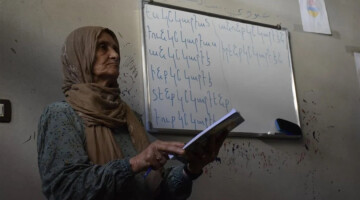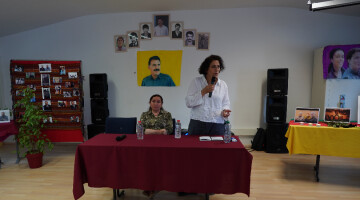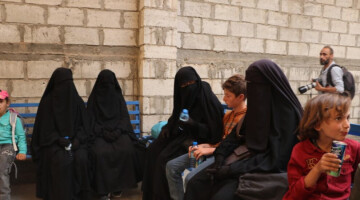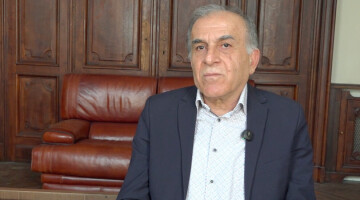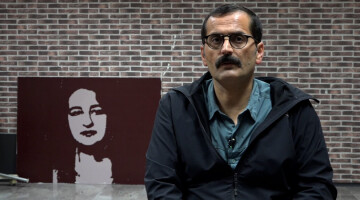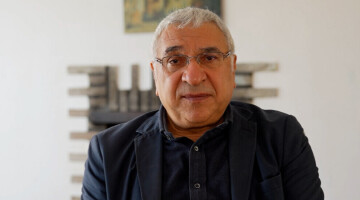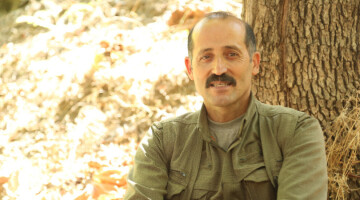On 29 June 1925, the Kurdish resistance leader Şêx Said (Şêx Seîdê Pîran) and 46 of his companions were executed in the old town of Amed. A Turkish Independence Court, a special type of court that was established during the so-called war of liberation, sentenced them to death by hanging. They were accused of launching an uprising against the secularization policy of the Turkish state.
Rebellion against deprivation of political autonomy
The rebellion, which broke out on 13 February 1925 in the village of Pîran in Gêl (Eğil) near Amed under the leadership of Şêx Said, was the beginning of numerous Kurdish rebellions after the end of the First World War, against the newly formed Turkish nation-state following the fall of the Ottoman Empire. The rebellion was against the denial of Kurdish existence, the withdrawal of political autonomy and the fascist Turkish policy.
Hereditary head of the Naqşabendi order
The strength of the army camp grew steadily with the gained territory. On 28 February, the group around Şêx Said had already grown into an "army" of 20,000 men. However, their success and progress was characterized less by organized attacks by a regular task force than by the influence of Şêx Seîd. This was great not only because he was the inherited head of the Naqşabendi order, but also because he was also the leader of the tribes in the Kurdish provinces. Wherever the insurgents advanced, the locals joined them. To this day, Şêx Seîd enjoys a very high reputation in Kurdish society.
15,000 dead in the suppression of the uprising
A few weeks later, on 26 March 1925, Turkish military units began air and ground attacks on suspected retreats of the Kurdish "rebels". Initially, 25,000 soldiers had been deployed to the region. At the beginning of April, the Turkish troop strength reached about 52,000 men, but the power struggles and rivalries between local tribal leaders, which were escalating in Elazığ at the time, came in handy for the state in the "fighting of the insurgency". Some of them sided with the troops from Ankara. The result was inevitable: the uprising was crushed in blood and at least 15,000 people were killed. By the end of April, the "enemy" had penetrated to the core of the resistance. Şêx Said and his comrades-in-arms, who had meanwhile retreated to Dara Hênî, were caught on their way to Muş. A brother-in-law of the cleric, Kasım Ataç (called Qaso), who had served as an officer in the Ottoman Empire, had betrayed them. Soon after, the insurgents were transferred to Amed, where, on 28 June 1925, 53 of them were sentenced to death by hanging by the "Diyarbakır Eastern Independence Court" for "rebellion against the state". The execution of the sentences began in Sûr on the same day. Şêx Seîd and 46 of his friends were publicly executed the next day, on 29 June.
The Kurdish movement sees itself in the tradition of Şêx Said
The Kurdish liberation movement sees itself in the tradition of the resistance of 1925 and further Serhildan as under the leadership of Pîr Sey Rızo (Seyit Riza) and the couple Alişêr and Zarife 1937/38 in Dersim. In a message on the occasion of the upcoming death anniversary, the Kurdistan Societies Community (KCK) paid tribute to Şêx Seîd and his friends as "revolutionaries and freedom fighters" of the Kurdish people. The statement said: “They opposed the newly established Turkish state's denial of Kurdish existence and identity and the betrayal and injustice done to the Kurdish people, and fought for the freedom of the Kurdish people. They continued this resistance no matter what, remaining committed to the values they fought for to the end. Their stance against the threat of execution by the murderous regime and enemy of the Kurdish people demonstrated their unwavering commitment to the Kurdistan cause. The fight of Şêx Said and his friends and their commitment to this fight are of great importance to the people of Kurdistan. The Kurdish people will never forget the efforts and sacrifices of these people and the memory of them.”
Execution of Şêx Said the first in a long chain of massacres
With the Treaty of Lausanne on 24 July 1923, today's state borders of Turkey were defined - and Kurdistan was divided into four. This also laid the foundations for the disregard for the Kurdish people and the denial of their existence. Since then, Kurds have been subjected to genocide, assimilation and massacres under the sovereignty of the nation states of Turkey, Iraq, Iran and Syria. The KCK said: “The Turkish state in particular has made the realization of the Kurdish genocide its main goal. As part of this goal, policies of assimilation and genocide were pursued in Kurdistan, the language, identity and culture of the Kurdish people were banned, and Turkishness was imposed on the Kurdish people.”
However, the murder of Şêx Said and his friends is the first in the long chain of genocidal practices that the Turkish state has carried out over a hundred years after the execution of these resistance leaders. In the shape of Recep Tayyip Erdoğan's AKP-MHP regime, the murderous state still relies on its policy of massacres of Kurds who will not be subjugated. As a Kurdish liberation movement, we promise to prevent the intended annihilation of our people. Our solidarity goes to Şêx Said and all other fallen soldiers of Kurdistan. The struggle will continue until liberation.”






